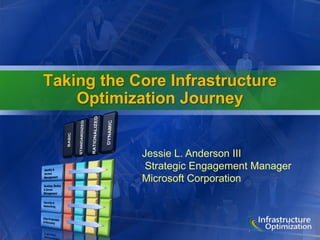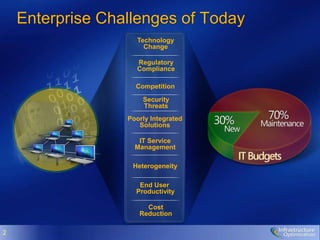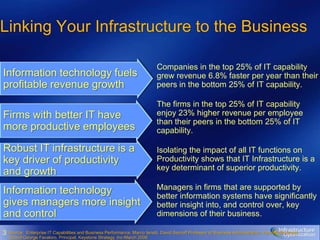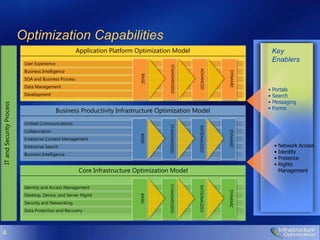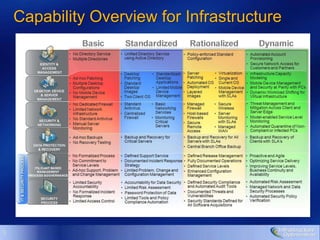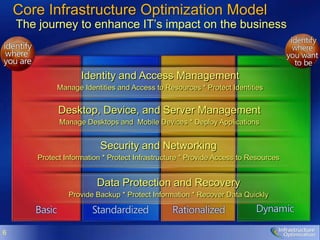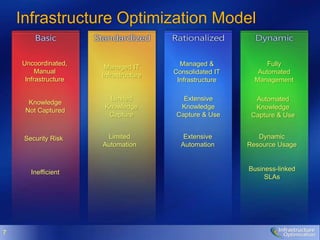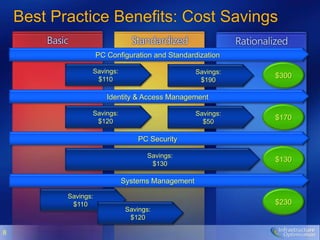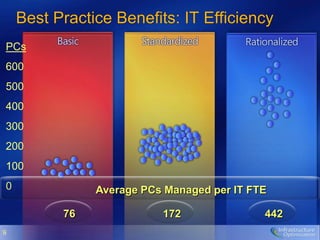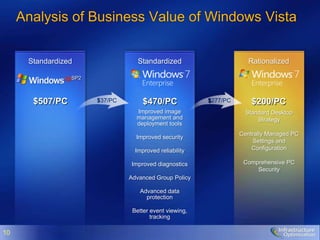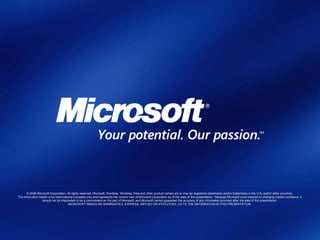Microsoft Core Infrastructure Overview
- 1. STANDARDIZEDBASICRATIONALIZEDDYNAMICTaking the Core Infrastructure Optimization JourneyIdentity & Access ManagementDesktop, Device& Server ManagementSecurity & NetworkingJessie L. Anderson III Strategic Engagement ManagerMicrosoft CorporationData Protection& Recovery1
- 2. Enterprise Challenges of TodayTechnologyChangeRegulatoryComplianceCompetitionSecurityThreatsPoorly IntegratedSolutionsIT ServiceManagementHeterogeneityEnd User ProductivityCostReduction
- 3. Linking Your Infrastructure to the BusinessInformation technology fuelsprofitable revenue growthCompanies in the top 25% of IT capability grew revenue 6.8% faster per year than their peers in the bottom 25% of IT capability.The firms in the top 25% of IT capability enjoy 23% higher revenue per employee than their peers in the bottom 25% of IT capability.Isolating the impact of all IT functions on Productivity shows that IT Infrastructure is a key determinant of superior productivity.Managers in firms that are supported by better information systems have significantly better insight into, and control over, key dimensions of their business.Firms with better IT havemore productive employeesRobust IT infrastructure is akey driver of productivityand growthInformation technologygives managers more insightand control Source: Enterprise IT Capabilities and Business Performance, Marco Iansiti, David Sarnoff Professor of Business Administration, Harvard Business School George Favaloro, Principal, Keystone Strategy, Inc-March 2006
- 4. Application Platform Optimization ModelOptimization CapabilitiesUser ExperienceBusiness IntelligenceSTANDARDIZEDBASICADVANCEDDYNAMICSOA and Business ProcessData ManagementDevelopmentKey Enablers Business Productivity Infrastructure Optimization ModelUnified CommunicationsIT and Security ProcessCollaborationSTANDARDIZEDBASICRATIONALIZEDDYNAMICEnterprise Content ManagementEnterprise SearchPortals
- 5. Search
- 6. Messaging
- 7. FormsBusiness IntelligenceCore Infrastructure Optimization ModelIdentity and Access ManagementDesktop, Device, and Server MgmtSTANDARDIZEDBASICRATIONALIZEDDYNAMICSecurity and NetworkingData Protection and RecoveryNetwork Access
- 8. Identity
- 9. Presence
- 10. Rights ManagementCapability Overview for Infrastructure
- 11. Core Infrastructure Optimization ModelThe journey to enhance ITŌĆÖs impact on the businessIdentity and Access ManagementManage Identities and Access to Resources * Protect IdentitiesDesktop, Device, and Server ManagementManage Desktops and Mobile Devices * Deploy ApplicationsData Protection and RecoveryProvide Backup * Protect Information * Recover Data QuicklySecurity and NetworkingProtect Information * Protect Infrastructure * Provide Access to Resources
- 12. Uncoordinated,ManualInfrastructureManaged &Consolidated ITInfrastructureFullyAutomatedManagementManaged ITInfrastructureLimitedKnowledgeCaptureExtensiveKnowledgeCapture & UseAutomatedKnowledgeCapture & UseKnowledgeNot CapturedLimitedAutomationExtensiveAutomationDynamicResource UsageSecurity RiskBusiness-linkedSLAsInefficientInfrastructure Optimization Model
- 13. Best Practice Benefits: Cost SavingsPC Configuration and Standardization$300Savings:$110Savings:$190Identity & Access Management$170Savings:$120Savings:$50PC Security$130Savings:$130Systems Management$230Savings:$110Savings:$120
- 14. Average PCs Managed per IT FTE76172442Best Practice Benefits: IT EfficiencyPCs6005004003002001000
- 15. SP2Analysis of Business Value of Windows VistaStandardizedStandardizedRationalized$470/PC$507/PC$200/PC$37/PC$277/PCImproved image management and deployment toolsImproved securityImproved reliabilityImproved diagnosticsAdvanced Group PolicyAdvanced data protectionBetter event viewing, trackingStandard Desktop StrategyCentrally Managed PC Settings and ConfigurationComprehensive PC Security
- 16. ┬® 2006 Microsoft Corporation. All rights reserved. Microsoft, Windows, Windows Vista and other product names are or may be registered trademarks and/or trademarks in the U.S. and/or other countries.The information herein is for informational purposes only and represents the current view of Microsoft Corporation as of the date of this presentation. Because Microsoft must respond to changing market conditions, it should not be interpreted to be a commitment on the part of Microsoft, and Microsoft cannot guarantee the accuracy of any information provided after the date of this presentation. MICROSOFT MAKES NO WARRANTIES, EXPRESS, IMPLIED OR STATUTORY, AS TO THE INFORMATION IN THIS PRESENTATION.
Editor's Notes
- #3: 70% of IT budgets (in the broad sense) go to reactive stuff and maintenance activities. Only 30% are addressing the Challenges of Today. ThereŌĆÖs a systems problem, thereŌĆÖs a server down, my mailŌĆÖs out of space, a virus is running rampant and buried IT resources, I canŌĆÖt access the billing system. Then, the top executives, board and shareholders are concerned about a smarter business-intelligence and way of viewing all that data you have in the database,They want you to do more with less, (a/k/a cost-reduction and efficiency) AND, theyŌĆÖre concerned about compliance and risk mitigation.
- #6: This image lists the basic requirements for each capability to advance through the optimization levels.
- #7: Next slide: being able to evaluate the cost savings of the environment, that weŌĆÖve gone through and helped them understand the move from one pillar to the next what the potential financial impact would be. Next slide: a results (form) that describes the outcome of the IO assessment. The main point is to connect the products with the capabilities that they are wanting to improve.
